Types Of ClausesThe notion of clause is critical in this part of English grammar. It is one of the most visible sentence-building blocks. They aid in a better comprehension of the grammar. Clauses not only make writing more manageable but they also improve sentence quality. While they seem to be the most basic portion or a simple branch, their utilization in the sentence makes it more complicated. 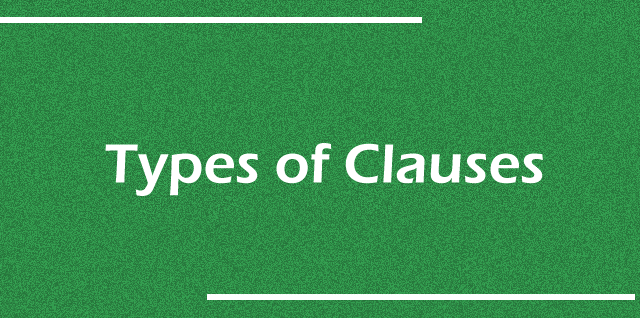
The different words can be classified as adverbs, verbs, nouns, adjectives, and so on. A sentence is primarily a group of words that have been arranged or organized in a meaningful way. The phrases, on the other hand, are a collection of words that do not have a specific meaning, subject, or even a verb. As a result, the insertion of phrases in the sentence provides meaning. The clause is sandwiched between sentences and phrases. The clause has a distinct subject, meaning, predicate, and verb. Clauses are the foundation of the English language. A clause is any sentence that has a subject (the person doing the activity) and a verb (an action term). A clause, as opposed to a phrase, is a collection of words that is understandable and makes logical sense but not completely. What Does the Word 'Clause' Mean?In English, a clause is a set of words or phrases that include just one subject and one finite verb. The subject can be disguised, but the verb must be apparent. The verb might be a single word (for example, "operated," "engaged," or "sang"), or it can include helping verbs (for example, "will feed" or "has been creating"). Whereas phrases are the collection of words which lack a subject, a predicate, and a finite verb and may be introduced to the sentence as adjectives, nouns, or adverbs. While we may attach clauses to meaningfully lengthen a statement, unlike a phrase, a clause can have a correct sense like the statement since it has a subject and a predicate, i.e., a finite verb. Let us look at an instance of a clause:
"A clause is a comprehensive, meaningful sentence that includes both the subjects and the predicates." As a result, CLAUSE = SUBJECT + PREDICATE (VERB). [S + P] The subject, in this case, refers to the sentence's activity, and the predicate is the one who brings that subject to completion. Let us have a look at a few examples for a clearer picture;
It is critical to remember that a sentence must include both the subject and the verb at a minimum once. A clause would not be formed if either of the parameters were missing. Let's look at how clauses are classified in different ways now. Let us better understand the kinds of clauses and their sorts, as well as clause examples. 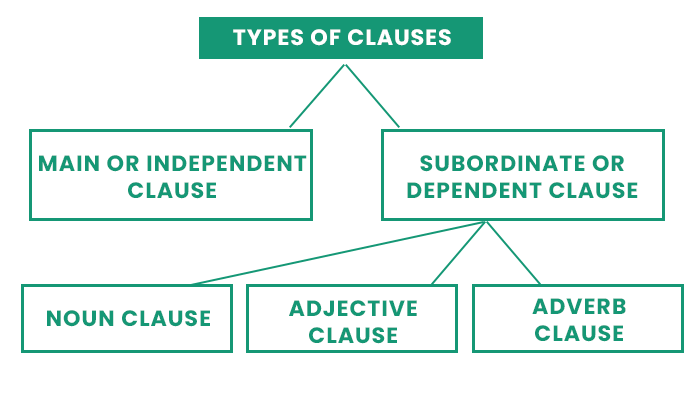
Types of ClausesAs stated above, a clause, like a phrase, is a set of connected words; but, besides a phrase, a clause comprises a subject and verb. There can be the following kinds of clauses;
Along with a subject and verb, an independent clause represents a complete notion and can exist independently as a complete sentence. On the other hand, the subordinate or dependent clause does not convey an entire idea and is not a sentence. A sentence fragment is a common error that happens when the subordinate phrase exists alone. 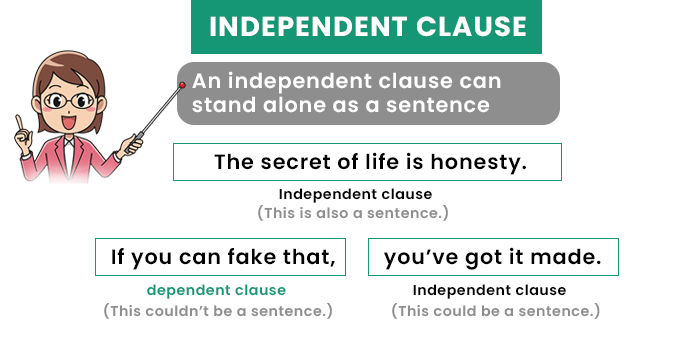
What Is an Independent Clause?The main clause is a collection of words that includes a subject and a verb. A major clause can stand alone and form a complete sentence. Since they are self-contained, main clauses are also independent clauses since they do not require any extra information to make perfect sense. They can exist independently without the help of another clause. They express an entire thought. Sentences might have two major clauses or one main clause and another sort of clause. Whenever there is only one primary clause and another sort of clause, the second clause relies on the primary clause for meaning. Main clause examples encompass :
Grammatically complete assertions, such as these, are sentences that can stand on their own. They are known to be independent (or major) clause whenever they are part of longer sentences. Now have a look at the following examples;
Based on the preceding instances, the clause "I sing" is referred to as an independent clause because it may construct a valid, complete sentence without the other portion (shipyard). 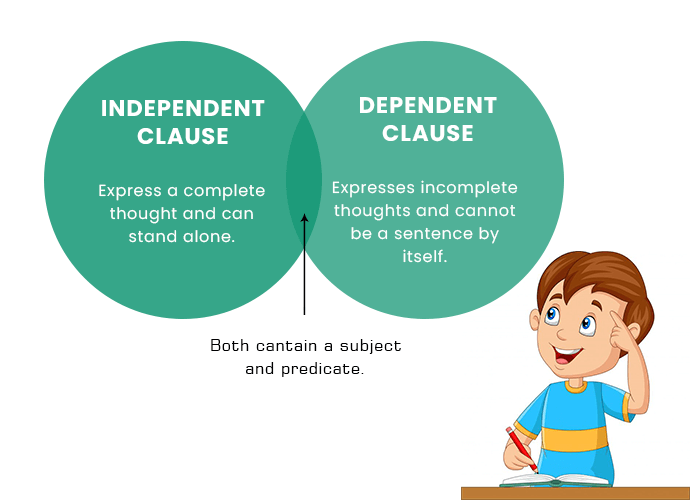
Here are a few more.
Another crucial concept to understand when discussing 'what is a clause in English?' is the subordinate (or dependent) clause! 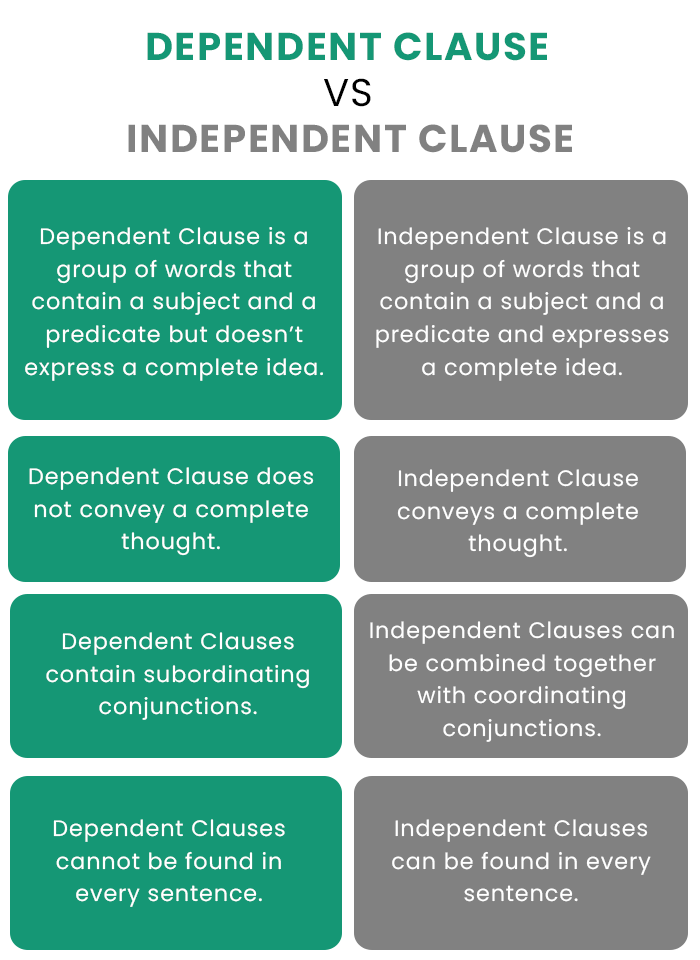
Subordinate Clauses or Dependent ClausesSubordinate clauses, unlike main clauses, require some assistance to sound right, and they are also known as dependent clauses. A subordinate clause refers to the clause that, despite having the subject and the verb, cannot exist alone as a complete, meaningful sentence. It does not include a whole thought, as does a major or the main clause. Subordinating conjunction must connect it to the main phrase. Subordinate clause instances include :
Since it is not a complete thought,' sitting gladly' is a subordinate clause. The primary clause, 'the dog gave birth,' is essential for the reader to comprehend the meaning and message. Dependent clauses cannot substantially function on their own for sentence completion. They must be utilized in conjunction with the independent clauses to provide assistance. The presence of simply a dependent clause does not complete or fulfill the meaning. Also called the subordinate clause. What Are Coordinate Clauses?A coordinating clause is formed by joining two independent clauses of equal value. Coordination conjunctions link these clauses. Coordinate clauses, like subordinate clauses, combine two phrases, making it difficult to distinguish between them. To remember the distinction between the two, consider the definition of 'coordinate.' To coordinate is to combine on an equal footing. A coordinate clause consists of two phrases that are equivalent in importance or significance. So, recall that the two sentences collaborate to form one coordinate clause in a coordinate clause. Coordinate clauses include the following :
So, coordinating conjunction connects these two clauses. I like dancing, and I like singing. Both 'I like dancing and 'I like singing' are primary clauses that can stand alone. The coordinating conjunction, 'and,' has brought them together to form coordinate clauses. Coordination conjunctions (and, but, for, nor, or, so, and yet) or semicolon can be used to unite two or more separate clauses. The most crucial thing to understand is that an independent clause can function as a full sentence on its own. The independent clause in the below-mentioned example is a simple sentence. Jessica combed her dark, thick locks. The coordinating conjunction follows, which connects two separate clauses. Freda left, andJessica brushed her dark, thick locks. A semicolon follows, which connects two independent clauses. Freda left; Jessica brushed her dark, thick locks. Note: Every sentence must have a minimum of one independent clause.After she advised Freda to leave, Jessica combed her dark, thick locks. The independent clause in the preceding sentence is accompanied by the clause that cannot exist independently: After she advised Freda to leave. Jessica combed her dark, thick locks while she advised Freda to leave. The independent clause is accompanied by the clause that cannot exist on its own: while she advised Freda to leave. 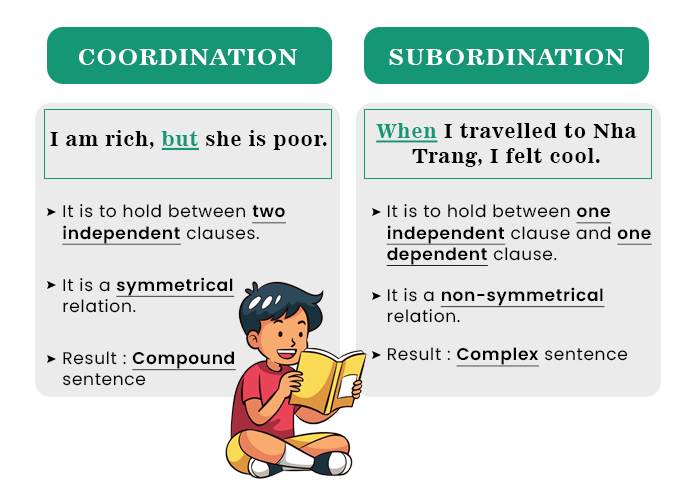
Using Coordinating Conjunctions At The Start Of SentencesAny of the coordinating conjunctions (and, but, for, nor, or, so, and yet) can be utilized to connect two separate clauses. Is it possible to start a sentence using one of these conjunctions? No one learned how to proceed. But everybody consented that something ought to be done. You shouldn't, according to an old rule. However, beginning a phrase with the coordinating conjunctions is now permitted. (Take, for example, the above sentence.) Beginning a phrase in this manner might sometimes produce the desired impact. It separates the clause while emphasizing its link to the preceding clause. Types of Dependent ClausesThere are three types of dependent clauses or subordinate clauses. Therefore, within dependent clauses, there are three major categories of clauses that comprise the most significant and essential component of clauses; there are other kinds as well, but they are -
Adjective ClausesAn adjective clause is a generic adjective in a statement that includes both the subject and the predicate. As a result of being a dependent clause, it cannot stand on its own, as previously stated. It takes a lot of practice to be able to improvise and shape those kinds of sentences. A relative pronoun (including like whom, whose, which, or that) or a relative adverb precedes the adjective clauses (when, where, or why). A relative pronoun or adverb is used in conjunction with a subject and/or a verb in this sort of phrase. 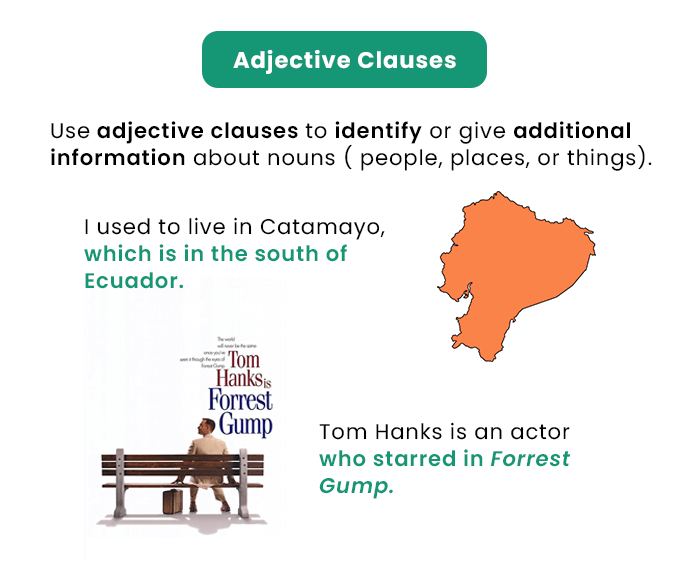
The adjective clauses, are like a subordinate clauses. So these are dependent clauses since these rely on the remaining sentence to make complete sense. Watch out for specific words to help you recall how to detect an adjective clause. Just relative pronouns (who, whose, etc) and subordinate conjunctions may be employed to begin the adjective phrases (when and where). 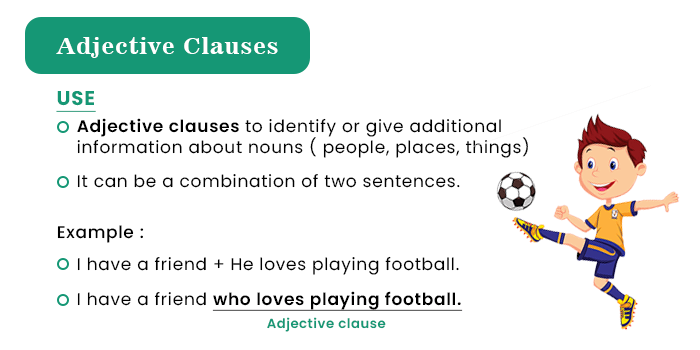
Adjective clauses include the following :
The adjective clauses, as mentioned above are the dependent clauses since they rely on the remaining of the sentence to be logical. Because the statement "who has blonde hair" isn't a complete concept, it wouldn't make logical sense by itself. Noun ClausesA noun clause is any clause that functions similarly to a noun. In other terms, the clause could be substituted with the noun, and the statement will still make complete sense. Noun clauses perform similar to noun and pronoun. As the name implies, a phrase is composed of a noun that can be either the subject or the predicate, like "which", "that", and so on. These comprise a subject and a verb but no comprehensive thought; therefore, it can never exist independently as a sentence. A pronoun or subordinating conjunction begins a noun sentence. 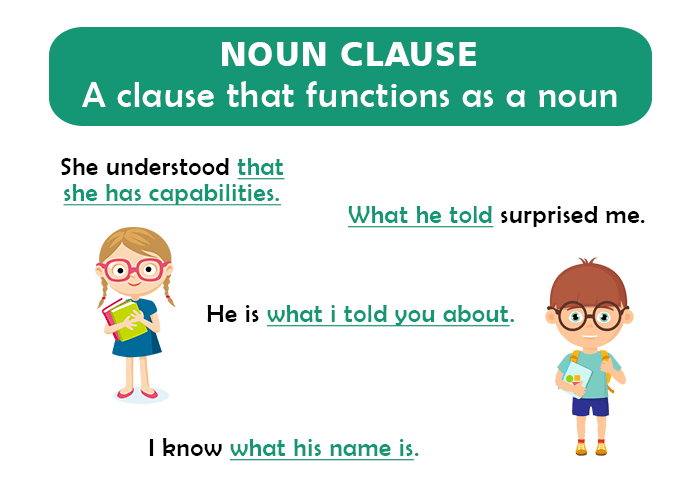
Noun clauses include the following :
Adverbial ClausesThis type of phrase should be given careful consideration. Don't mix up an adverb and an adjective. An adjective is something that characterizes a noun or a pronoun. An adverb, on the other hand, is something that defines the adjective. As a result, the adverbial clause is a typical adverb found in a phrase that fulfills the clause criterion. Adverb clauses are also dependent clauses which do not make sense independently. 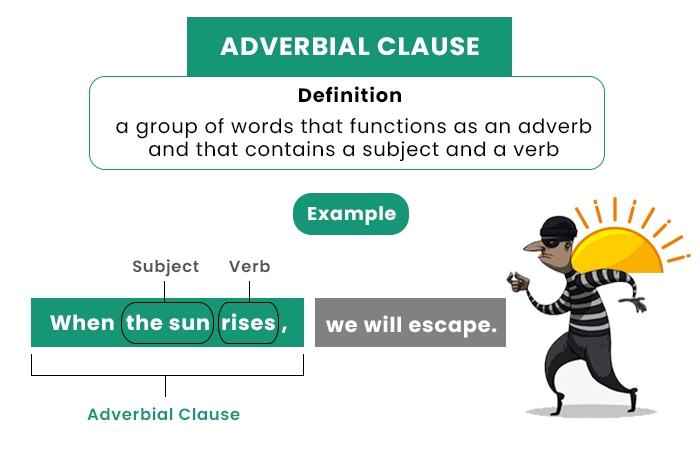
It makes good sense because of an independent clause. So, therefore are often referred as dependent adverb clauses. An adverb clause, like an adverb, provides a description and alters the sentence. This type of clause also has a subject and a verb, but it does not convey an entire notion. Adverb clauses include the following :
To summarize the entire content, one must know, grasp, and apply the use of clauses in sentences. Since it is impossible to make an agreement without these clauses. The clause is anything that comes between the phrase and the sentence; it has a subject, a clear meaning, and even a predicate. These clauses are essentially divided into two sorts, and they can be further subdivided depending on their usage. The clauses utilized in the sentence can also be identified, where some of the clauses act as the sentence and provide full information. Some clauses rely on other clauses to provide meaning to the sentence.
Next TopicConditional Clause
|
 For Videos Join Our Youtube Channel: Join Now
For Videos Join Our Youtube Channel: Join Now
Feedback
- Send your Feedback to [email protected]
Help Others, Please Share










